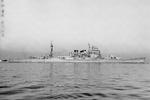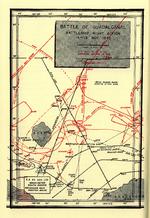Atago
| Country | Japan |
| Ship Class | Takao-class Heavy Cruiser |
| Builder | Kure Naval Arsenal |
| Laid Down | 28 Apr 1927 |
| Launched | 16 Jun 1930 |
| Commissioned | 30 Mar 1932 |
| Sunk | 23 Oct 1944 |
| Displacement | 9,850 tons standard; 14,616 tons full |
| Length | 669 feet |
| Beam | 68 feet |
| Draft | 20 feet |
| Machinery | 4-shaft geared turbine, 12 Kampon boilers |
| Power Output | 133,100 shaft horsepower |
| Speed | 35 knots |
| Range | 8,500nm at 14 knots |
| Crew | 773 |
| Armament | 10x8in, 4x5in, 4x24in torpedo tubes, 2x40mm anti-aircraft, 60x25mm anti-aircraft, 4x13.2mm anti-airc |
| Armor | 1.5-5in main belt, 1.3in main deck, 0.5-1in upper deck, 3-4in bulkheads, 1in turrets |
| Aircraft | 3 |
| Catapults | 2 |
Contributor: C. Peter Chen
ww2dbaseAt the start of the Pacific War, the fast and heavily armed Atago was the flagship of Vice Admiral Nobutake Kondo's Cruiser Division 4. She sailed with the Japanese fleets that supported the invasion of Malaya and the Philippines in Dec 1941, then sailed to the South Pacific and became involved in the Battle of the Java Sea and the attack on Darwin. In Apr 1942, she unsuccessfully gave chase to William Halsey's task force that launched the Doolittle raiders. In Jun 1942, she participated in the Battle of Midway. In late 1942, she operated in the South Pacific, participating in the Battle of the Eastern Solomons, Battle of Santa Cruz Islands, and the Second Naval Battle of Guadalcanal during which she shared the credit of damaging the American battleship South Dakota. She later helped the evacuation of Guadalcanal. On 5 Nov 1943, while refueling in Rabaul, she was attacked by American aircraft from carriers Saratoga and Princeton. Atago sustained three near misses by 500-lb bombs, losing 22 men including commanding officer Captain Nakaoka. On 10 Feb 1944 and 6 Apr 1944, she was unsuccessfully attacked by American submarines Permit and Dace, respectively. On 13 Jun 1944, she participated in the Battle of the Philippines Sea. Like Midway, it was a battle that dramatically damaged Japanese naval aviation strength, but again like Midway Atago emerged unscathed. In Oct 1944, she left Lingga Roads near Singapore as the flagship of Admiral Takeo Kurita's First Mobile Striking Force, sailing to join the Leyte campaign. On 23 Oct 1944, she was attacked by American submarines Darter and Dace in the Palawan Passage. Atago capsized and sank at 0553, killing 360. Kurita was forced to transfer his flag first to a destroyer than again to the battleship Yamato. While the sinking of the fleet's flagship did not dramatically affect, the loss of communications personnel did cause minor consequences later on in the operation.
ww2dbaseSource: Wikipedia.
Last Major Revision: Feb 2007
Heavy Cruiser Atago Interactive Map
Photographs
 |  |  |  |
Maps
 |
Atago Operational Timeline
| 30 Mar 1932 | Atago was commissioned into service. |
| 10 Dec 1941 | Japanese submarine I-58 spotted British battleship HMS Prince of Wales and battlecruiser HMS Repulse off British Malaya, launched five torpedoes, but all of them missed; beginning at 1117 hours, Japanese aircraft began to attack. Overwhelmed, HMS Repulse was sunk at 1233 hours (513 killed), followed by HMS Prince of Wales at 1318 hours (327 killed); destroyers HMS Electra, HMS Express, and HMS Vampire rescued 1,862 survivors. On land, the British commanders dispatched the 1st Battalion of the 14th Punjab Regiment and the 2nd Battalion of the 1st Gurkha Rifles regiment to Changlun and Asun in northern British Malaya to counter the Japanese advance; contact was made at Changlun at 2100 hours, where two Japanese tanks were destroyed before the Punjabi troops fell back toward Asun. |
| 5 Nov 1943 | During the US raid on Rabaul, New Britain, Atago was damaged by three near misses, killing 22, including commanding officer Captain Nobuki Nakaoka. |
| 6 Nov 1943 | Atago departed Rabaul, New Britain for Truk, Caroline Islands to receive temporary repairs. |
Did you enjoy this article or find this article helpful? If so, please consider supporting us on Patreon. Even $1 per month will go a long way! Thank you. Share this article with your friends: Stay updated with WW2DB: |
Visitor Submitted Comments
18 Jun 2020 02:39:25 PM
Takao class were true pieces of art, powerful, fast and superb design.
In addition to the incredible pyramid bridge, the wavy hull and black paint give an air of grandeur.
The 20.3cm / 50 Model EĀ¹ weapons were modified and the spread improved in 1938, the barbettes have 76mm NVNC.
Chokai is a true representative of this class, in addition to the elite reputation, his speed in tests was 35.58 knots. About the leader of 4 Sentai, Atago, was responsible for having damaged the battleship South Dakota at 16,000 meters partially penetrating the belt.
All visitor submitted comments are opinions of those making the submissions and do not reflect views of WW2DB.
» Hironobu
» Kondo, Nobutake
» Koyanagi, Tomiji
» Kurita, Takeo
Event(s) Participated:
» Invasion of the Philippine Islands
» Invasion of Malaya and Singapore
» Dutch East Indies Campaign, Java
» Attack on Darwin
» Battle of Midway and the Aleutian Islands
» Guadalcanal Campaign
» Solomon Islands Campaign
» Philippines Campaign, Phase 1, the Leyte Campaign
Document(s):
» Interrogation Nav 82, Captain Tsuneo Shiki
Partner Sites Content:
» Atago Tabular Record of Movement
- » 1,150 biographies
- » 337 events
- » 43,917 timeline entries
- » 1,241 ships
- » 350 aircraft models
- » 207 vehicle models
- » 374 weapon models
- » 123 historical documents
- » 260 facilities
- » 470 book reviews
- » 28,541 photos
- » 432 maps
Winston Churchill
Please consider supporting us on Patreon. Even $1 a month will go a long way. Thank you!
Or, please support us by purchasing some WW2DB merchandise at TeeSpring, Thank you!
27 Jan 2007 11:05:26 PM
One of my favourite ships of WWII